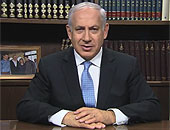
The following is text of an open letter to the citizens of Israel from Prime Minister Benjamin Netanyahu ahead of the proposal to resume the diplomatic process, that was submitted to the Cabinet on (Sunday, 28 July 2013):
"From time to time, prime ministers are called on to make decisions that go against public opinion – when the matter is important for the country.
In order to make decisions that are supported by the public, there is no need for prime ministers.
At the present time, it seems to me that it is very important for the State of Israel to enter into a diplomatic process. This is important both in order to exhaust the chance of ending the conflict with the Palestinians and in order to establish Israel's position in the complex international reality around us.
The major changes in our region – in Egypt, Syria and in Iran – not only place challenges before the State of Israel but they also create considerable opportunities for us.
For these reasons, I believe that it is important for the State of Israel to enter a diplomatic process that will continue for at least nine months – in order to check if it is possible to reach an agreement with the Palestinians during this time.
But even with all of the importance that I ascribe to the diplomatic process, I was not prepared to accept the Palestinians' demands for withdrawals and freezes as preconditions for entering negotiations.
Neither was I prepared to accept their demand to release Palestinian prisoners before the start of negotiations. I did agree to release 104 Palestinians in stages after the start of the negotiations and in accordance with the circumstances of their progress.
This is an incomparably difficult decision, it is painful for the bereaved families and it is painful for the entire nation and it is also very painful for me.
It collides with the incomparably important value of justice.
It is a clear injustice when depraved people, even if most of them have sat in prison for over 20 years as in this case, are released before they have finished serving their sentences.
The decision is difficult for me seven-fold because my family and I personally know the price of bereavement stemming from terrorism. I know the pain very well. I have lived with it every day for the past 37 years.
The fact that previous Israeli governments have released over 10,000 terrorists does not make it easier for me today, and did not make it easier when I decided to bring back Gilad Shalit.
Gilad Shalit's return home entailed an incomparably difficult decision for me – releasing terrorists. But I believed that the value of bringing children back home needed to overcome this difficulty.
People in positions of leadership need to choose between complex choices and sometimes the necessary decision is especially difficult when most of the public opposes it.
Thus I decided to end Operation Pillar of Defense after the elimination of arch-terrorist Ahmed Jabari and after the severe blows the IDF dealt to Hamas and the other terrorist organizations.
I made the decision to end the operation even though most of the public supported continued action, which would have required entering the Gaza Strip on the ground. As Prime minister, I thought that the goal of deterrence had been mostly achieved by the determined actions that we carried out.
Today, almost one year after the end of Operation Pillar of Defense, we are witness to the quietest situation in the south in over a decade. Of course, this quiet can fray at any minute but my policy is clear on all fronts: We will, as much as possible, foil threats against us in a timely manner. We will react strongly to any attempt to harm our people.
In the next nine months, we will consider whether there is a Palestinian element opposite us that, like us, truly wants to end the conflict between us.
Such a conclusion will be possible only under conditions that will ensure security for Israel's citizens and ensure our vital national interests.
If we succeed in achieving such a peace agreement, I will submit it to a referendum.
Such a fateful decision cannot be made by a close vote in the Knesset.
Every citizen must be allowed to directly influence our future and our fate on such a crucial issue.
The best answer we can give to those same base murderers that sought to defeat us through terrorism is that in the decades that they sat in prison, we built a glorious country and turned it into one of the most prosperous, advanced and strongest countries in the world.
I promise that we will continue thus.
Yours,
Benjamin Netanyahu."